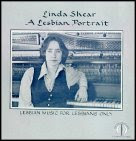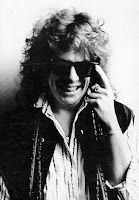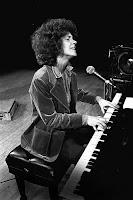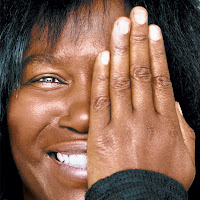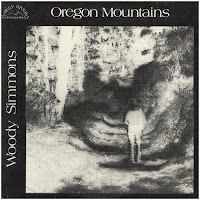In 1980 I entered a period of extreme sexual compulsion that was almost entirely related to beginning work on my childhood sexual abuse but having to invent the healing process every inch of the way -- because it didn't exist yet. Nowhere. A handful of us, working class dykes, put our faith in each other and created theory which, by and large, has stood up to time.
One evening that year I walked with two other dykes in my SF Brosnan Street apartment building, the women/roommates next door, Joan Annsfire and Julie Twitchell, to a potluck on Treat Street near 16th that was being held by a woman we all vaguely knew named Yohimbe. Someone, I bet Joan, gave voice to the largely unspoken truth that most of our gatherings in the wimmin's community those days, political or not, had a real agenda of looking for other women to -- fall in love with, go to bed with, become lifelong devoted companions as Alix Dobkin put it, all or any of the above. The three of us were single, and we laughed about how the only reason we'd drag ourselves to another gathering with semi-strangers to eat badly-made salad and Calistoga was to check out the action. Someone, probably me, suggested we be open about it and make a competition of it: Whoever had the most phone numbers of new women on the walk home would win.
I walked into that party on the prowl, and immediately locked gaze with Michele, who was visitng for the week from Portland. She was fat, pink-skinned, Jewish, with bright yellow hair that had a curl even cropped short. She was wearing purple sweatpants and a faded red Wallflower Order T-shirt. She was making a huge bowl of guacamole, and I immediately went to help her, pressing so much garlic into it that eventually she and I were the only ones who could stand to eat it.
I won the phone number contest, but the only one I remember calling later was Michele. She went back to Portland and we began a torrid correspondence, voluminous handwritten outpourings of confession, treatise, and poetry on the backs of old flyers. We visited each other when we could, which was not often because neither of us had any money. But I began going to Portland every November, a standing date. And it was that first visit, to a bone-cold house she shared with four other lesbians, when I first heard Ferron's album Testimony. Hitting the wimmin's community with the splash of a boulder.
It was sitting in Michele's dank living room, looking at that rose and olive Testimony album cover, when I first listened to
They say slowlyI burst into tears and Michele scooted to wrap her generous thighs around me, asking me what was wrong. I couldn't tell her. I didn't know, really. And my despair solidified when I listened to "Ain't Life A Brook." That night in bed, Michele and I kissed but then rolled apart, sleeping back to back for the warmth, staying solo nonetheless. We didn't become lovers, after all. Which for me was an exception during that period, and a good thing.
Brings the least shock
But no matter how slow I walk
There are traces
Empty spaces
And doors and doors of locks
Michele, like about a third of the dykes I knew, was trying on S/M as a means of dealing with her sexual abuse demons. She had whips on the wall behind her mattress on the floor. In our letters she'd told me what it meant to her, the liberation she felt in assuming roles, and I had said I wanted to try it. I wrote a piece of erotica I sent to her, about overpowering her and making her come against her will, She was a bottom and I imagined myself as a top.
I didn't want to feel bad about the crud that came up inside me when sex entered the picture in any relationship, how out of control I felt. I wanted control. I wanted to have nothing wrong with me.
Instead of pursuing a path that would give me an illusion of control and "safety" with regard to my desire, however, I wound up diving into the abyss and emerging elsewhere. I firmly believe that a lot of us who chose that direction have been labeled as "anti-sex" by our cohort who faced the same demons we did and decided if all they could have was desire with male conditioning defining most of the terms, that was better than no desire at all. I was willing to face a complete loss of sex if that's what it took to undo the imprint I had received as a child. A percentage of us were not willing to take that risk. I know what was right for me, and that's all I can ask for.
But in 1980, we were at the very beginning of that movement divide. We had Fran Winant in 1970 telling us
eat rice have faith in womenBy 1975, we had Meg and Holly and Cris and Alix telling us how to cross the desert for each other, how to let ourselves be loved for our crazy eyes and the laughter which loosens our bones. How to stand on the mountain and not let them come here to take it. How to make love with each other, not to or at each other. Judy had assured us we were making love for the best reasons. We had gone forth, and we had even considered how to break up while still allowing only love to come between us.
what I don’t know now
I can still learn
if I am alone now
I will be with them later
if I am weak now
I can become strong
slowly slowly
if I learn I can teach others
if others learn first
I must believe
they will come back and teach me
But in 1980, Ferron reminded us sometimes we break up for good, sell the furniture and put away the photographs. Reagan was embarked on his mission to destroy working-class safety and with it the activist class. What remained of our numbers would be further attenuated by the human immunodeficiency virus entering our brothers' bloodstreams, calling many sisters to become the first AIDS caretakers because (a) gay men didn't know how to do community the way we did and (b) we believed when our turn came, they would come back and teach us. Those of us who had access to trust funds, education money, middle class security were increasingly seduced by a relief from the struggle. If we wanted children of our own, it was time to start having them. Clean and sober arrived as a community need.
And to our utter dismay, we discovered daddy was still showing up in bed with us. Some of us found nothing at all sexy about it.
Ferron sang
But life don't clickety-clackIn 1985, Michele lost weight, found a Jewish man to marry, went to work as a manager in Nike, and overnight became critical of what she called my downward mobility. I decided the way to address my need for control was to partner with a woman who took all the initiative and space in our intimacy. Unions had been broken, liberal was now an epithet, and the neocons who would arrive 15 years later to staff Dubya's regime were talking up the idea of a winnable nuclear war. It's a good thing I didn't know how far social justice and women's love would continue to unravel, part and parcel of each other.
Down a straight-line track
It comes together and it comes apart
However, now 30 years on, those doors and doors of locks have been opened enough to allow a breeze, and there are a great many of us still alive who eat rice and have faith in women. The wheel always spins around to new territory, and I can sing with certainty
But by my life be I spirit
And by my heart be I woman
And by my eyes be I open
And by my hands be I whole
Tuesday is Ferron's birthday. You might mosey over and tell her what she means to you.
[Love to Martha for the conversation which helped me formulate this essay. And thanks always to the Pleiades who saved my life.]


